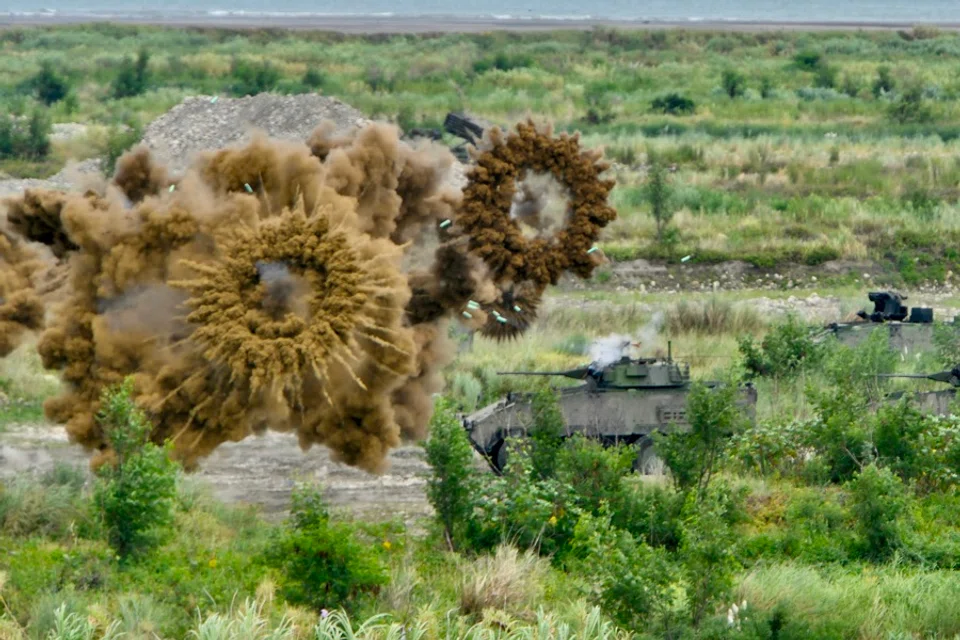Chinese academic: A 'reunification by force' would be Taiwan's last
Chinese academic Shen Jinhao says that when it comes to Taiwan, the mainland will not start a fight it is not ready to finish. If it launches a "reunification by force", Taiwan would be subdued in one fell swoop, even before the US has a chance to make a meaningful intervention.

Former Taiwan President Ma Ying-jeou recently criticised President Tsai Ing-wen's refusal to acknowledge the "1992 Consensus" as a move that would push Taiwan towards the brink of war. He suggested that if mainland China were to wage war against Taiwan, the battle would be Taiwan's last. His comments attracted much attention and drew the ire of the pan-Green coalition.
In a recent poll it conducted, the Taiwanese Public Opinion Foundation interpreted Ma's comments as saying that the mainland would launch such a quick invasion on Taiwan that it would be over before the US military could come to Taiwan's aid. 58.3% of respondents disagreed with this statement, while 33.9% agreed.
In another poll conducted by a Chinese folk research association (中华民间研究协会), 58.7% of Taiwanese respondents believed that the US would send troops to defend Taiwan should a war break out between both sides of the Taiwan Strait.
It would be a grave matter if reunification did not succeed even after using force.
On 9 June, the pan-Green television programme Zheng Knows (《郑知道了》) interviewed Liang Tung-ping, a Taiwanese war correspondent who used to cover the Iraq War. Liang said that it would not be easy for China's People's Liberation Army (PLA) to launch a naval attack across the sea. He pointed out that it had taken the US over 20 days to fight its way on land from Kuwait to Baghdad. Thus, even if the PLA launched 30,000 missiles, it could not easily seize Taiwan.

I certainly do not wish to see a war breaking out between both sides of the Taiwan Strait. But looking at what the media is saying, I have to raise a few basic questions.
Odds stacked against Taiwan
First, under what circumstances would China launch a reunification by force? The answer is simple. It is stated in the Anti-Secession Law.
Second, would China launch a reunification by force unprepared? Certainly not. It would be a grave matter if reunification did not succeed even after using force. This was what Ma alluded to when he said the first battle would be the last.
Third, would China factor in the possibility of US intervention before embarking on reunification by force? Most certainly. If China hastily launched an invasion but was intercepted by the US military at the Taiwan Strait or forced to retreat, how would it accept such an outcome? The world has changed in the last 70 years and so has mainland China. With advancements in information and intelligence, it is now possible to estimate the military power and tactics of various countries and regions. Thus, without certainty of victory, it would not make a move.
Yet, without question, before making a move, the mainland would not only do military simulations, but also make comprehensive assessments of its economic resilience, international response, and manner of governance after reunification.
According to a 22 August report in the digital version of the China Times (《中时电子报》), American news website RealClearInvestigations pointed out on 17 August that in war game simulations between Pentagon and Rand Corporation officials, the Blue Team representing the US military has regularly failed to defeat a mainland invasion of Taiwan. US experts opined that "Taiwan would fold in a week or two".
Rand defence analyst David A. Ochmanek said, "For years the Blue Team has been in shock because they didn't realise how badly off they were in a confrontation with China." Of course, this is how an American think tank official put it. We are not sure if the information is reliable or if it is a smokescreen. Yet, without question, before making a move, the mainland would not only do military simulations, but also make comprehensive assessments of its economic resilience, international response, and manner of governance after reunification. Without these preparations, China would not hastily launch a reunification by force.
But one must not forget a crucial point: it is the mainland that decides whether there is a war.

Fourth, once military force is used, can Taiwan withstand the blow? True, Taiwan has a certain level of military strength and is even researching and strengthening its asymmetric defense strategy and deterrence tactics now. But one must not forget a crucial point: it is the mainland that decides whether there is a war.
Considering Taiwan's strength, I reckon it would not be the one to initiate a large-scale attack on the mainland. Based on what military officials are saying, the mainland clearly knows and has already marked out all of Taiwan's military facilities. Once the mainland uses force for reunification, it would certainly destroy Taiwan's important military targets, and make sure that Taiwan's combat systems such as its military radars, airports, hangars, ports, electronic warfare and missile bases can no longer operate. With counterattacks, systems that were not destroyed during the first round of attacks would be targeted by subsequent rounds of attacks. As the cycle continues, how much military strength would Taiwan have left? Besides, it does not take long to launch these attacks.
Is it worth it for the US and China to fight to this extent for the sake of Taiwan?

US intervention may trigger nuclear option
Fifth, back to the topic of US military aid. While Taiwan is not one of the US's core interests, once the US military intervenes, no one knows how bad it would get. The US once said that if their aircraft carriers were destroyed, they would resort to using nuclear weapons. If the US intervenes in the Taiwan Strait, it would need to deploy its aircraft carriers. Once that happens, would China still hold back on its Dongfeng, YJ, CJ, and JL missiles? Would it stand by and watch the enemy's fighter jets freely attack the PLA? If US aircraft carriers are destroyed, and the US is forced to use its nuclear weapons, would China still keep its nuclear weapons away? Is it worth it for the US and China to fight to this extent for the sake of Taiwan? Yet, to ensure that the country is not divided, China would find it necessary to make such counterattacks.
Even if the US really came to Taiwan's aid, the same RealClearInvestigations report aforementioned stated, "China's strategy would be to get an invasion fleet across the Taiwan Strait before the US could come to its ally's aid". And as Rand defence analyst Ochmanek said in that report, "Once that happens we'd face an Iwo Jima situation. Once Taiwan was [is] occupied, the option of retaking it with an amphibious assault of our own would be very unattractive."
Just because its political leader does not wish to be called the "governor of a province", should the people and soldiers stubbornly follow suit?

If the war escalates to the extent of the Battle of Iwo Jima, it can be expected that Taiwan would be done for. Is reunification so scary that one would rather Taiwan be done for than be unified? Just because its political leader does not wish to be called the "governor of a province", should the people and soldiers stubbornly follow suit? Are not the mainlanders and Taiwanese businessmen and their families who are living on the mainland doing fine? Those who are rational should be clear about all these. Besides, the Battle of Iwo Jima - on a lone island in the Pacific Ocean and far away from mainland Japan - had cost the US military 6,821 lives. Can the US military even reach and stay put on Taiwan, an island in close proximity to Fujian and easily covered by the mainland's rocket artillery?
Given the above, the Taiwanese people should have a clearer understanding and stop having wild thoughts about receiving military aid from the US. The US might intervene in some way to weaken mainland China and sow cross-strait discord. But being used as a battleground would be too large a burden for Taiwan to bear.



![[Photos] Fact versus fiction: The portrayal of WWII anti-Japanese martyrs in Taiwan](https://cassette.sphdigital.com.sg/image/thinkchina/3494f8bd481870f7c65b881fd21a3fd733f573f23232376e39c532a2c7593cbc)

